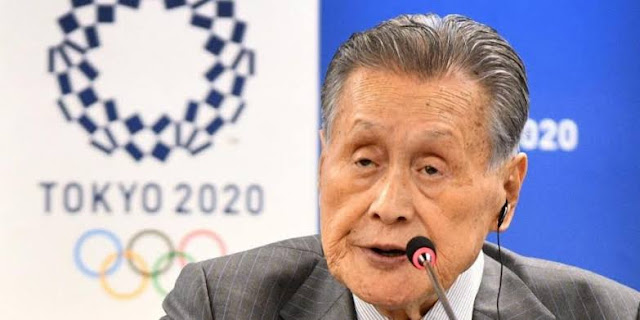Yoshiro Mori, Olimpic head of Tokyo 2020 Friday over sexist remarks, he announced he would resign.
 |
| Yoshiro Mori, head of Tokyo 2020, resigned from his post Friday,for his sexist remarks-ISSEI KATO / POOL / AFP |
Yoshiro Mori, head of Tokyo 2020, resigned on Friday over sexist remarks, but it was not immediately clear who would replace him.
This controversy and his resignation and leadership vacuum create a suspicion that the organizers delayed the Games less than six months ago due to the virus.
Mori, 83, claimed last week that 'When you increase the number of female executive members, if their speaking time isn`t restricted to a certain extent, they have difficulty finishing, which is annoying,'.
On Friday he announced he would resign.
"My inappropriate statement has caused a lot of chaos. I would like to express my sincere apologies" I would like to express my sincere apologies," he said at a meeting of Tokyo's 2020 executive board and council.
"I wish to resign as the president as of today,"
"All that is urgent is to host the Olympics from July. My presence will not be an obstacle to that."
There was confusion over who would be in Mori's place, who first chose the notorious sports administrator Saburo Kababuchi, 84, to replace him.
The change appeared to be a completed deal, the former footballer said in an interview with local media, describing his planned priorities for the new job.
“There are some concerns within the organizing committee,” Asahi Shimbun newspaper reported on Friday morning.
"I don't think an old man like him would explain it to the people," he said of the Games.
Hashtags opposing Kababuchi's appointment in Japan became a Japanese trend on Twitter, with the country's Olympic Minister Seiko Hashimoto saying in a statement that "nothing has been decided."
"The organising committee will make a decision... while listening to opinions from a range of people," she said.
"It is desirable to go through a formal procedure."
By early Friday afternoon, local media reported Tokyo 2020 had come under pressure from the government over the appointment and that sources close to Kawabuchi said he had decided to turn down the job.
His withdrawal leaves the race for the key post wide open, though reports suggested Hashimoto -- a former Winter and Summer Olympian and one of just two women in the cabinet -- was a leading candidate.
Mori's resignation caps just over a week of uproar after he told members of Japan's Olympic Committee that women have difficult speaking concisely, "which is annoying."
He apologised but then defended his remarks and told reporters: "I don't speak to women much."
The comments drew fire at home and abroad. Several hundred Olympic volunteers have since withdrawn and a petition calling for action against him gathered nearly 150,000 signatures.
While Kawabuchi was considered an able administrator, the appearance of Mori hand-picking his successor did not go down well.
"It makes no sense for a resigning chief to appoint his successor," one Tokyo 2020 board member told the Mainichi Shimbun.
"There are steps to this process."
The fallout over Mori's remarks comes with organisers already battling public doubt about holding the huge international event this summer.
Around 80 percent of Japanese polled in recent surveys back either further postponement or an outright cancellation.
Organisers have tried to quell the disquiet by releasing virus rulebooks for athletes, officials and media, including restrictions on movement and regular testing.
But with Tokyo and other parts of the country under a virus state of emergency, doubts persist about the event's viability.
The first Olympic test event of the year has already been postponed because of Japan's current strict virus entry rules.
Japan's first vaccine approval is expected over the weekend, with thousands of medical workers first in line to be inoculated, likely by the end of February.
But the broader rollout will move slowly, with vaccination of the elderly not set to start until April.
Organizers are already battling public suspicion about holding a major international event this summer based on Mori's comments.
In the most recent survey, about 80% of Japanese respondents either postponed or canceled entirely.
Organizers are trying to correct these imperfections by publishing books on viral rules for athletes, staff and the media, including movement restrictions and routine testing.
However, there are doubts about the effectiveness of the event in a viral emergency in Tokyo and other parts of the country.
This year's first Olympic trial race has been postponed due to the current strict rules for the entry of the virus into Japan.
With approval of Japan's first vaccine expected this weekend, thousands of first-line medical professionals are expected to be vaccinated by the end of February.
However, its widespread use will continue gradually as vaccination of the elderly will not start until April.
Post a Comment
Don't allow spam link